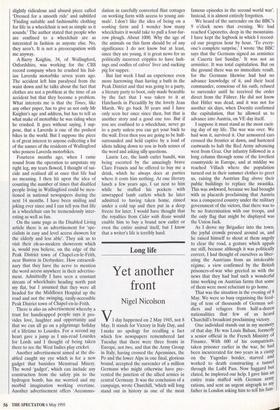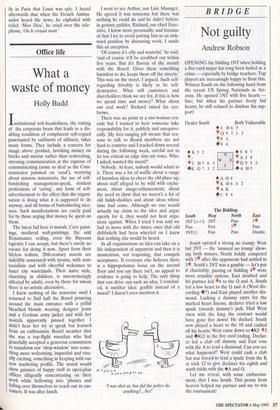Long life
Yet another front
Nigel Nicolson
VI day happened on 2 May 1945, not 8 May. It stands for Victory in Italy Day, and I make no apology for recalling a fact which few newspapers remembered last Tuesday that there were three fronts in Europe, not two, and that the Army Group in Italy, having crossed the Apennines, the Po and the lower Alps in one final, glorious bound, accepted the surrender of a million Germans who might otherwise have pre- vented the junction of the allied armies in central Germany. It was the conclusion of a campaign, wrote Churchill, 'which will long stand out in history as one of the most famous episodes in the second world war'. Instead, it is almost entirely forgotten.
We heard of the surrender on the BBC's 9 o'clock news that evening. We had reached Caporetto, deep in the mountains. I have kept the logbook in which I record- ed our progress hour by hour. 'To every- one's complete surprise,' I wrote 'the BBC says that the Germans signed an armistice at Caserta last Sunday.' It was not an armistice. It was total capitulation. But on the ground there was no immediate result, for the Germans likewise had had no advance knowledge of it, and their local commander, conscious of his oath, refused to surrender until he received the order direct from the Fiihrer. He did not know that Hitler was dead, and it was not for another six days, when Doenitz confirmed the capitulation, that he allowed us to advance into Austria, on VE day itself.
I suppose it must stand as the most excit- ing day of my life. The war was over. We had won it, survived it. Our armoured cars crossed the frontier at dawn, and hastened eastwards to halt the Red Army advancing west from Graz. Our infantry followed in a long column through some of the loveliest countryside in Europe, and at midday we reached Villach where the population turned out in their summer clothes to greet us, raising the Austrian flag above their public buildings to replace the swastika. This was awkward, because we had brought with us placards proclaiming that Austria was a conquered country under the military government of the victors, that there was to be no fraternisation with our troops, and the only flag that might be displayed was the Union Jack.
As I drove my Brigadier into the town, the joyful crowds pressed around us, and he raised himself to shout at them angrily to clear the road, a gesture which appals me still, because although it was politically correct, I had thought of ourselves as liber- ating the Austrians from an intolerable regime, a view confirmed by the British prisoners-of-war who greeted us with the news that they had had such a wonderful time working on Austrian farms that some of them were most reluctant to go home.
That was the situation in the evening of 8 May. We were so busy organising the feed- ing of tens of thousands of German sol- diers and refugees from half-a-dozen nationalities that few of us heard Churchill's broadcast proclaiming victory.
One individual stands out in my memory of that day. He was Louis Balsan, formerly a senior official in the French Ministry of Finance. With 600 of his compatriots, taken prisoner earlier in the war, he had been incarcerated for two years in a camp on the Yugoslav border, starved and worked to death constructing a tunnel through the Loibl Pass. Now haggard but elated, he implored our help. I gave him an entire train stuffed with German army rations, and sent an urgent airgraph to my father in London asking him to tell his fam- ily in Paris that Louis was safe. I heard afterwards that when the French Ambas- sador heard the news, he exploded with relief. 'Mon Dieu', he cried over the tele- phone, 'On le croyait mort.'



































































 Previous page
Previous page